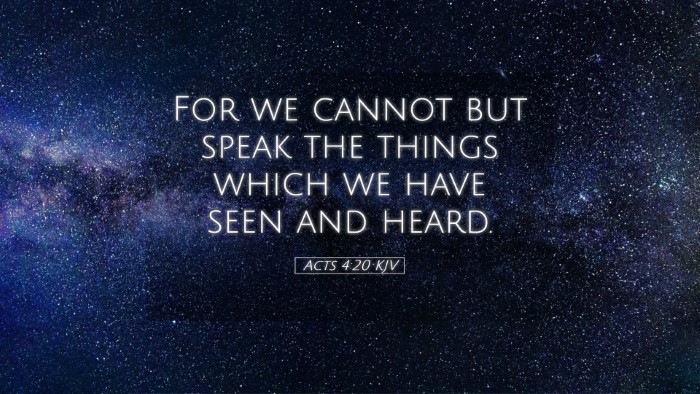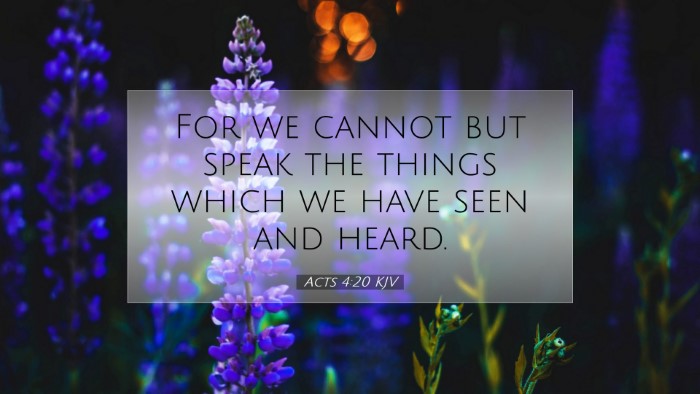Bible Commentary on Acts 4:20
Verse: "For we cannot but speak the things which we have seen and heard." (Acts 4:20)
Contextual Background
Acts 4:20 occurs in the midst of a significant moment in the early church. Following the miraculous healing of a lame man (Acts 3:1-10), Peter and John are arrested for preaching the resurrection of Jesus. They stand before the Jewish council, signifying the escalating opposition they faced. The response in verse 20 underscores the apostles' steadfast commitment to proclaiming the Gospel despite threats and potential persecution.
Matthew Henry's Commentary
Matthew Henry emphasizes the necessity of divine compulsion in the act of witnessing. He notes that true believers are unable to restrain themselves from speaking about Christ due to the overwhelming nature of their experiences with Him. Henry comments on the relationship between personal testimony and evangelism, asserting that believers are inclined to share what they have witnessed and heard concerning Christ.
Henry further elaborates that this verse reflects a profound commitment, demonstrating that the apostles prioritize obedience to God over the fear of man. The contrast between human authority and divine mandate is a vital theme in Henry's analysis, where he regards their testimony as a vital aspect of their faith and mission.
Albert Barnes' Commentary
Albert Barnes presents a more detailed examination of the phrase "cannot but speak." He interprets it as expressing an urgent necessity, akin to an internal compulsion. Barnes postulates that the apostles' personal encounter with Christ and the truths of the Gospel formed an unbreakable bond that drove them to witness regardless of the consequences.
Barnes also highlights the theological implications of the phrase "the things which we have seen and heard," reflecting the essence of apostolic authority rooted in firsthand experience. This authority distinguishes the apostles from mere philosophers or religious speakers, instilling a challenge for contemporary believers to engage actively with the Gospel.
Adam Clarke's Commentary
Adam Clarke takes a closer look at the power of personal experience in shaping the conviction of the apostles. He notes that their powerful testimonies serve as the backbone of their evangelistic efforts. Clarke argues that it is the vivid experiences—their visions, teachings, and the resurrection of Christ—that fueled their passion.
Clarke additionally discusses the sociopolitical tension surrounding the apostles' work. He perceives the council's attempts to silence them as a larger representation of the world's rejection of the Gospel, stressing the importance of believers speaking boldly in the face of opposition.
Theological Implications
-
The Authority of Personal Testimony:
Both Henry and Barnes assert that personal experiences serve as a foundation for Christian witness. Believers are called to share their encounters with Christ—an invitation to communicate the transformative power of the Gospel in their lives.
-
The Nature of True Discipleship:
The apostolic commitment demonstrated in this verse reflects the essence of discipleship—an unwavering dedication to God's call above human authority. Discipleship is not merely about following doctrine but entails embracing the mission of evangelism.
-
The Challenge of Persecution:
The context of Acts 4:20 places believers in the arena of potential persecution. This verse challenges modern Christians to ponder their response to societal pressures against witnessing and speaking truth.
Application for Today’s Church
The insights from Acts 4:20 remind the church today of the imperative to faithfully proclaim the Gospel, even amidst a culture increasingly resistant to it. Pastors, theologians, and laypersons alike are encouraged to reflect on their testimonies. In a world full of distractions and challenges, the urgency to share the message of Christ can often wane, but the apostles serve as a model for how to engage authentically through the power of experience and divine calling.
As believers, we are called to engage our communities with the realities of our encounters with Christ. Acts 4:20 provides a timeless challenge to believers to speak out courageously about their faith, grounded in the experiences of seen and heard revelations.
Conclusion
Acts 4:20 encapsulates a profound truth about the necessity of vocalizing one's faith based on personal experience. Through reflections from notable public domain commentators, we see a rich tapestry of insights affirming the boundless energy that personal testimony carries in the Christian life. May we, like the apostles, be compelled by the Spirit to proclaim the truths we've seen and heard, honoring both our encounters with Christ and the mission to spread His Gospel regardless of the consequences.


